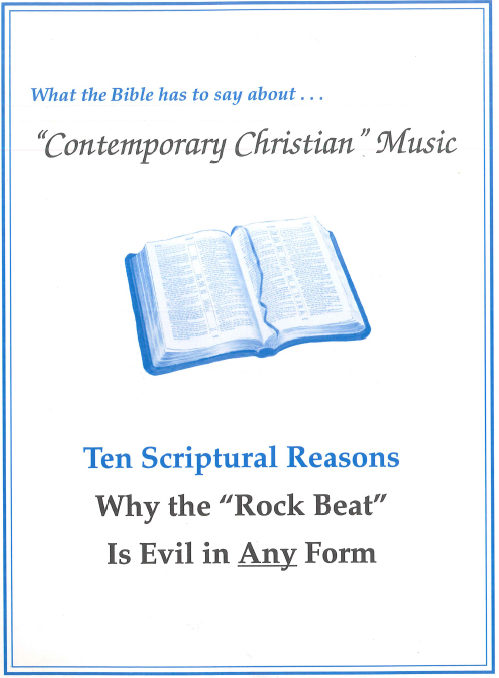Weaker Brothers Shouldn’t Boss Christians about Music, Food, or Fantasy
When I was a child, Christian weaker brothers1 had authority to boss you about all kinds of things.
By weaker brothers, I mean Christians who, by their own admission, were vulnerable to certain temptations.2
In one case, Christian leaders held up one specific weaker brother boss: a (possibly apocryphal) witch doctor, and/or former African tribal worshiper, who had converted to Christianity. One version of this anecdote was printed in a booklet from a (nastily legalistic) outfit called the “Institute in Basic Life Principles” (IBLP). The booklet’s title: “Ten Scriptural Reasons Why the ‘Rock Beat’ Is Evil in Any Form” (underline in original).
In April 1990, a Christian from Zimbabwe, Africa, arrived for his first visit to the United States. He is a native missionary under the Awana Youth Association. When he turned on a Christian radio station and listened to the music, he was shocked. Here is his report:
“I am very sensitive to the beat in music, because when I was a boy, I played the drums in our village worship rituals. The beat that I played on the drum was to get the demon spirits into the people.
“When I became a Christian, I rejected this kind of beat because I realized how damaging it was.
“When I turned on a Christian radio station in the United States, I was shocked. The same beat that I used to play to call up the evil spirits is in the music I heard on the Christian station.”
It wasn’t long before I realized the absurdity of this story:
Hey. Who put the witch doctor in charge of Christian moral practice?
This goes double if you heard, as I did, that the (apocryphal?) witch doctor was actually a new convert to Christianity:
With all due respect, why should new converts be the boss of Christian moral practice?
Scripture, in fact, specifically warns against letting a new convert become a church overseer. Paul says that if we do that, “he may become puffed up with conceit and fall into the condemnation of the devil.”5
But what if the witch doctor wasn’t a new convert? What if the account is true?
Then it still makes little sense for Christians to let him become a music boss:
- By all versions of the account I heard, the witch doctor wasn’t even trying to boss. He only made the observation about the music similarity. And/or a concern that it sounded like rhythms he and his witch-doctor friends used to try to summon spirits. It was someone else who later “weaponized” his words, as if they marked universal concern for all Christians.
- By the account’s own terms, the witch doctor had his own personal history with similar music. In his past, he had used certain sounds or rhythms alongside sinful behavior. In the present, he couldn’t help making the association. His story doesn’t apply to everyone else.
- Even if his story did apply to others, this does not overrule the path that God can redeem pagan practices and things—starting with us.
- The person’s opinions are not the same as revealed Scripture.
But Christians keep letting weaker brothers boss them about things.
Plenty of Christians keep going along with this weird tendency. They keep entrusting “weaker brothers” with unique authority over particular practices. Those relate to music, as we’ve seen. But they also related to things like food and popular culture:
What sorts of foods can we eat or avoid?
Let’s all listen to a person who has terrible food allergies, and/or terrible stories about what happened to her when she consumed a certain thing.
What kinds of fantasy stories can we enjoy or avoid?
Let’s all listen to a person who has a terrible backstory about being drawn into the occult and Satanism.
Are certain types of Christian music acceptable or too worldly?
Let’s all listen to a person who has a terrible backstory about being drawn into the occult and Satanism.
That last one is a particularly bizarre trend. Some Christians, historically, keep deciding to let Satan-worshipers be the best authority on the Devil’s powers and dangers. Sometimes it doesn’t even matter whether the Satan-worshiper has since received the gospel. I have heard Christians cite (apocryphal, anecdotal, or actual) current New Age or pagan teachers as authorities about spiritual warfare.
Shouldn’t we, you know—follow strong Christians instead?
The apostle Paul doesn’t venerate weaker brothers the way some Christians have.
He doesn’t say they’re strong. He says they’re weak. Weak means not strong. It means, “These are the people you should help.” It does not mean, “These are the people who have the inside view, so you should follow whatever standard they must follow.”
In fact, the very truth that Paul speaks openly about weaker brothers means he wants all the church, strong and weak alike, to adopt these categories.
Paul does not want stronger people to meet together and whisper about how legalistic the weaker brothers are. He doesn’t want weaker brothers to gather secretly and whisper about how the others keep compromising with the world. Instead, Paul wants the issues openly discussed. After reading his letters (probably publicly!) to the Roman or Corinthian church, everybody could meet together. They could figure out their strengths and weaknesses.
“Ah yes. I grew up in this particular Athenian cult. I can’t go near market so-and-so without feeling a compulsion to rejoin my old people.”
“Fascinating! I never have that issue. So I suppose if you need anything in that market, I could head out there for you.”
Stronger brothers and sisters have rarely if ever been tempted to sin by particular foods, holidays, popular culture, or more. Or they were once tempted to these sins, but through Scripture study, prayer, and hard holiness work, have achieved victory over those sinful temptations.
Weaker brothers, precisely because they’re weaker, don’t (yet?) have such victory. So they require special care.
By default, Christians should put the stronger believers in positions of authority. Because they’re, you know, stronger.
By default, Christians should not put the weaker brothers in positions of authority. Because they are weaker.
Maybe Christians have made progress in this area. I no longer see a lot of these anecdotes spread about. Whether because of more biblical teaching, or better sharing of information, believers seem more resistant to these weaker brother bosses. At least in the areas of food, holidays, and popular culture. If anything, we’re more vulnerable to acting like we’ve beaten back these gifts’ associated sins, rather than actually achieving this kind of victory, or following stronger Christians who have.
But nowadays, I think there’s one vital area in which weaker brothers are taking over Christian leadership.
Tomorrow, I’ll continue by explaining what area this is. Please pray that I can write with clarity and sensitivity. Because now we really get into thorny territory.
- And sisters. As my study Bible is fond of pointing out, the Greek term adelphoi, translated brothers, is a catch-all term that refers to men and women. ↩
- The phrase comes from Romans 14. Here, the apostle Paul urges Christians to be welcoming and sensitive to concerns of “the one who is weak in faith” (verse 1). See also 1 Corinthians 8–10. Here, Paul refers to “the weak” (1 Cor. 8:9). Weaker brothers are not following a higher standard of holiness. They are weak precisely because they cannot help associating some behavior with sin—possibly because of their own background. ↩
- I’ve copied the wording from this website. However, it credits only “guest article.” It does not give a date and does not mention the original source: the IBLP booklet “Ten Scriptural Reasons Why the ‘Rock Beat’ Is Evil in Any Form.” ↩
- One commentator provides another version of the “witch doctor” story on the Recovering Grace website: “Bill (that is, disgraced IBLP legalistic seminar leader Bill Gothard) repeated (sic) stated in his seminars that the origin of rock music was from African voodoo type of music. He usually gave the story of an African witch doctor that was visiting and heard ‘rock music’ and stated that this was the kind of music that the former witch doctor used in his practice of witchcraft and voodoo. He (Gothard) had serial variations of this story that he used in the seminars.” Source: Comment dated June 8, 2015, from “rob war,” in response to “The Phony Consequences of Rock Music,” RecoveringGrace.org, Nov. 14, 2011. ↩
- 1 Timothy 3:6. ↩













[…] Weaker Brothers Shouldn’t Boss Christians about Music, Food, or Fantasy | E. Stephen Burnett, Feb 21 […]
[…] Weaker Brothers Shouldn’t Boss Christians about Music, Food, or Fantasy […]
[…] article has been edited from its original version. In my original series, I continued to explore the one area where some “weaker […]